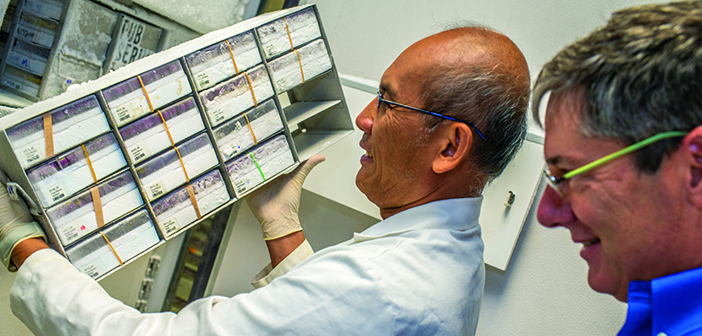In a study that could lead to a new vaccine, researchers have found an antibody that causes malarial cells to self-destruct.
Researchers have discovered a promising new strategy for combating malaria, a mosquito-borne parasite that claims nearly a half-million lives each year.
For a study reported in the journal Nature, researchers screened blood samples from children who had natural immune resistance to severe malaria infection. The study identified an antibody to a particular malaria protein, called PfGARP, that appears to protect resistant children from severe disease. Lab tests showed that antibodies to PfGARP seem to activate a malarial self-destruct mechanism, causing parasite cells living inside human red blood cells to undergo a form of programmed cell death.
The team is hopeful that vaccinating individuals with PfGARP to generate anti-PfGARP antibodies, or directly infusing anti-PfGARP antibodies, would protect them against severe malaria. The team developed preliminary versions of those vaccines, and testing in nonhuman primates has shown promise, the researchers report.
“We demonstrated in two independent studies in nonhuman primates that vaccination with PfGARP protects against a lethal malaria parasite,” says study senior author Jonathan Kurtis ’89 PhD’95 MD’96, the Stanley M. Aronson Professor of Pathology and Laboratory Medicine and chair of pathology and laboratory medicine.
“What’s exciting is that this is a vaccination strategy that attacks malaria in a way that it has never been attacked before—one in which the parasite becomes complicit in its own demise,” adds Kurtis, who is also the laboratory director of the Center for International Health Research at Rhode Island Hospital. “We are hopeful that this vaccine, perhaps combined with other malarial antigens, will translate into a strategy that can help prevent severe malaria in people.”
Testing of a human vaccine is likely years away, the researchers say, and there’s no way to be certain it will work. But the team is hopeful that the approach taken in this study, which looks for the factors that contribute to naturally occurring disease resistance, will prove effective where other approaches have not.
Continue reading here.
Learn how you can support Dr. Kurtis’s research.




